Let’s face it! Education is changing faster, and the biggest reason is AI. The old model of one-size-fits-all classrooms is now becoming outdated. Now, with the help of AI, students can learn at their own speed with lessons customized to their requirements.
As per Grand View Research, the AI in education market is forecasted to reach $32.27 billion by 2030. Isn’t it fascinating that AI has been doing so much for the education industry?
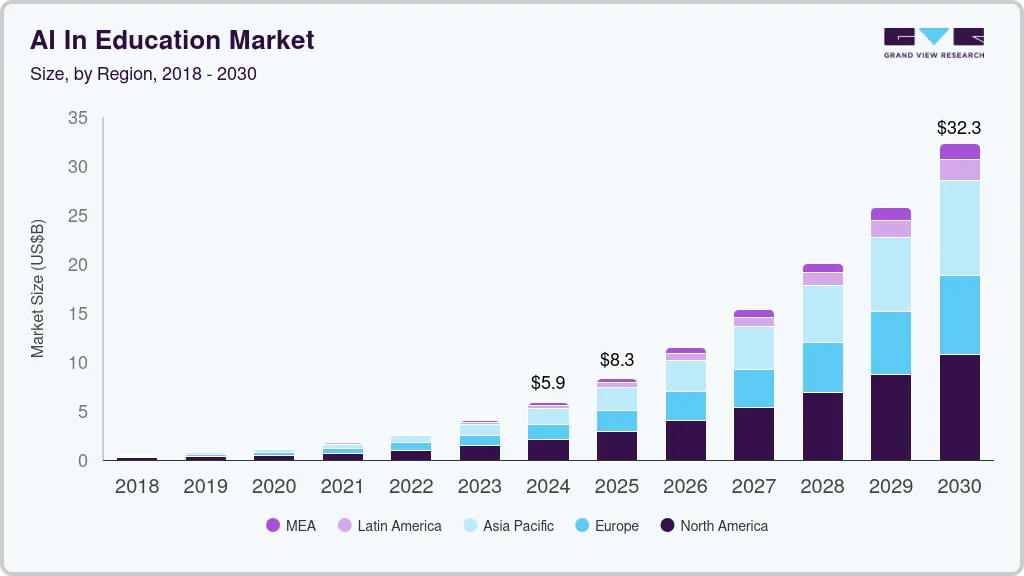
However, it is not just about schools getting on board; colleges, online learning platforms, and even corporate training are using AI-powered tools to improve outcomes. From personalized learning to smarter classrooms, AI makes education more accessible, engaging, and effective for everyone.
In this blog, we will discuss how AI is reshaping the education industry. From the benefits of AI in education apps to future trends in AI, we will cover it all.
So, let’s begin!
Why Does AI Matter for Learning Platforms?
AI is changing the education industry by making it smarter, personal, and more efficient to access.
If you want to know the role of AI in the education industry for expansion, then do check this out. A study by Global Market Estimates shows that the worldwide market size of AI in education is predicted to hit $20.54 billion by 2027. Now, let’s look at the scenarios of why this matters:
1. Personalized Learning for Every Student
AI helps customize lessons based on a student’s learning style, speed, and strengths. It adjusts the content to fit individuals’ requirements. For example, if a student struggles with math but is good at reading.
The AI in education apps gives more assistance in math and advanced reading tasks. If we look at some popular eLearning Statistics, it is shown that almost 60% of students perform better when using AI-based learning tools.
2. Faster Feedback and Assistance
Do you know AI-powered learning apps that provide faster feedback? Students do not have to wait for teachers to grade assignments. With AI, they get immediate feedback. This helps them in correcting their mistakes and quickly learn from them.
Some AI tools for teachers can also answer students’ questions, just like how teachers help students. Reports by EdTech Magazine show that 67% of students feel more confident in learning with instant feedback from AI tools.
3. Smart Content & Virtual Teachers
AI can make smart content. For instance, quizzes, summaries, flashcards, and even video lessons. It also powers virtual tutors that are available 24/7.
With this, students can learn anytime, anywhere, without the need for a teacher. As per HolonLQ, the AI-powered content is projected to support more than 100 million learners by 2026 on a global basis.
Benefits of AI in Education Apps
Education is not limited to just chalkboards or textbooks. With the adoption of AI, education applications are becoming smarter and easier to use for students.
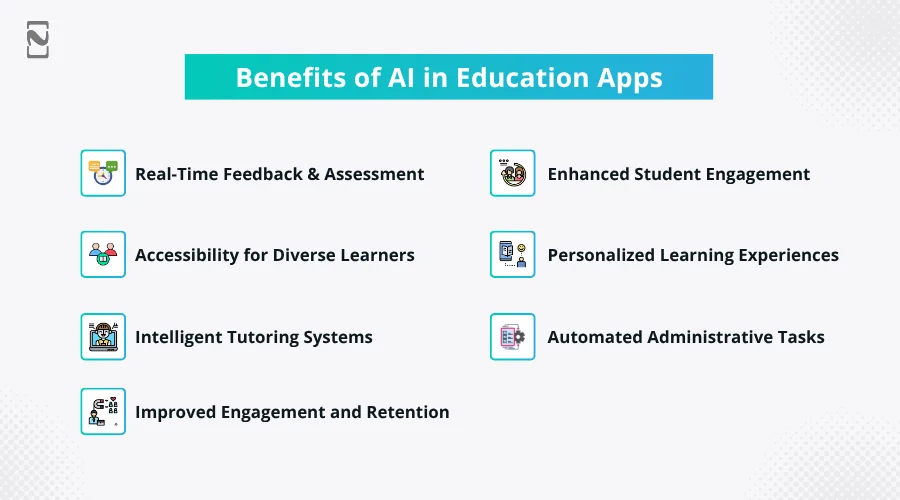
Let’s have a look at how AI is changing the way students learn with the following benefits.
-
Real-Time Feedback & Assessment
This is one of the benefits of educational apps with AI integration. AI-powered chatbots and virtual assistants are available 24/7, providing instant support. If a student is stuck on a tricky math problem at night, the AI can help them. They do not have to wait for class the next day. It is just like having a study friend in your pocket.
-
Accessibility for Diverse Learners
AI makes learning more inclusive. It can provide voice control, read-aloud options, and visual aids for students with physical disabilities.
Also, it can bring quality learning content right to their mobile phones for students who live in rural areas. It is totally online, and students do not have to go to the classroom.
-
Intelligent Tutoring Systems
AI does not replace teachers, but it can give them extra support or assistance. Educational applications can highlight which students need extra attention or which lessons were not understood. Teachers can help students with more focus and do not spend too much time figuring it out manually.
-
Improved Engagement and Retention
AI assists in turning boring lessons into exciting and engaging ones. It can suggest videos, engaging stories, and short games based on students’ interests.
This keeps their mind curious and motivates them to learn deeply. Gamification in education, supported by AI, enhances this process by adding interactive elements that boost engagement and improve retention.
-
Enhanced Student Engagement
Many teachers spend many hours grading tests or tracking attendance. AI in education apps handles these routine jobs more efficiently. This gives teachers more time to plan creative lessons or talk to students one-on-one. This enhances students’ engagement more effectively.
-
Personalized Learning Experiences
Gone are the days of universal lessons. Artificial Intelligence in education apps can adjust the learning path based on students’ performance.
For example, if a student is facing issues with fractions but is good at geometry, the app knows it and adapts. This builds a personalized learning experience that fits every student’s speed and style.
-
Automated Administrative Tasks
AI takes utmost care of repetitive tasks like checking quizzes or making reports for teachers. This frees up time for them to do what they do best, like teaching and motivating students. This can automate tasks or work of administration.
AI for Students and Teachers
Artificial intelligence is becoming a big part of education. It is not just limited to scientists or engineers anymore.
Today, AI-based education apps help both students and teachers in multiple ways. So, let’s check out how AI helps teachers and students separately.
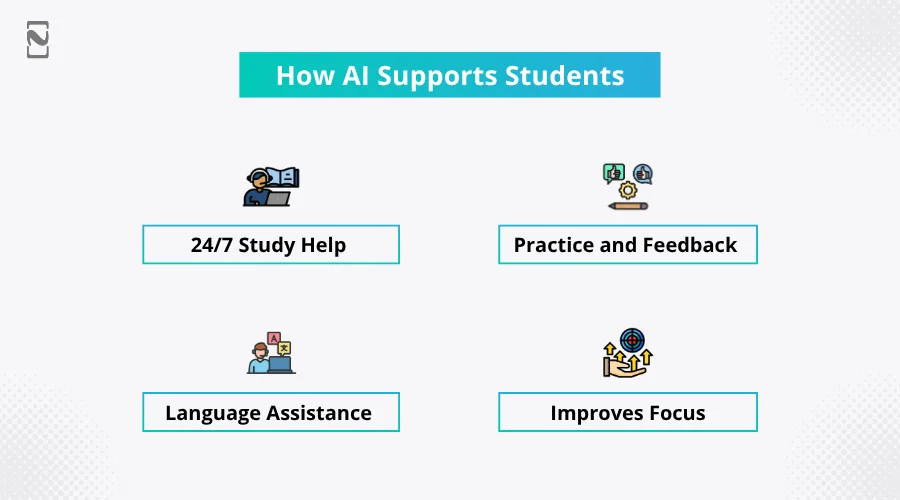
► How AI Supports Students
Smarter learning experiences tailored to individual needs through intelligent automation and real-time support.
-
24/7 Study Help
AI helps students in studying lessons and solving problems anytime, anywhere. They can ask questions to AI chatbots even at night before the examination. This reduces the need to wait for a teacher.
-
Practice and Feedback
Multiple AI tools provide instant and immediate feedback. If a student makes a mistake, AI-powered learning apps show where they went wrong and explain the right answer.
-
Language Assistance
For students learning new languages, eBook app development like Duolingo helps improve speaking, writing, and reading skills step by step.
-
Improves Focus
Some AI tools help students avoid distractions. They block social media for students or send gentle reminders to stay on task.
► How AI Supports Teachers
Helping teachers deliver personalized instruction through automation and real-time insights.
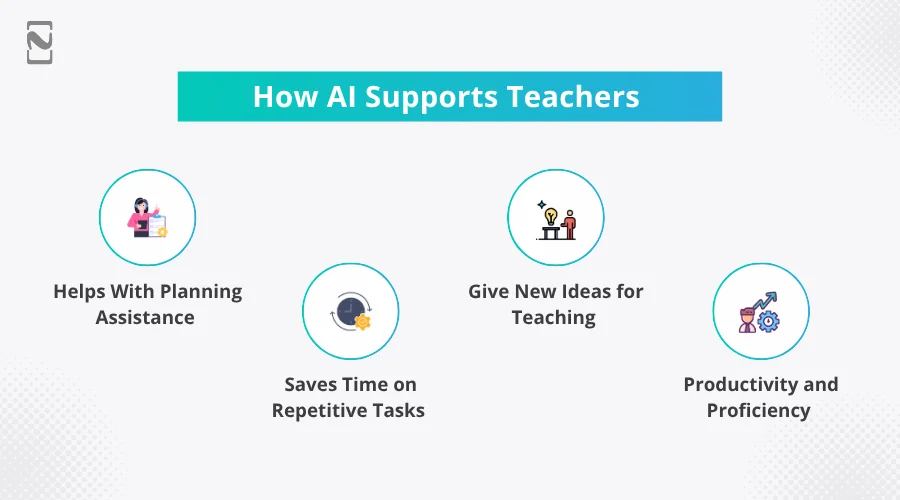
-
Helps With Planning Assistance
AI in educational apps can help teachers create lesson plans more effectively. These suggest topics, give ideas, and make worksheets for teachers. Also, it saves lots of time for teachers and provides better lesson plans.
-
Saves Time on Repetitive Tasks
An education app with AI integration can take care of repeated tasks. For example, marking daily attendance, sending reminders, and making reports. This gives them extra time to focus on their students and saves a lot of time.
-
Give New Ideas for Teaching
AI suggests fun ways to teach using games, videos, and quizzes. This makes learning more interesting for students. It also helps teachers to try new methods in the classroom. AI also provides new educational app ideas for teachers.
-
Productivity and Proficiency
Artificial intelligence in learning apps helps teachers work more efficiently. It can take care of routine tasks like grading, giving feedback, and staying in touch with students and parents. This can save a lot of time and enable educators to focus more on teaching.
Key AI Technologies Used in Education Apps
AI is transforming education by personalizing learning experiences and automating admin tasks.
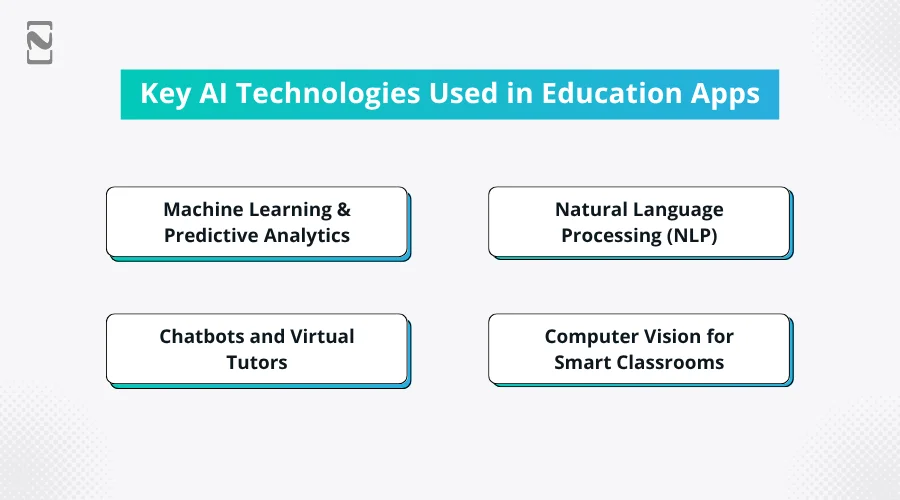
Here are some of the popular AI technologies that have been integrated into education apps.
♦ Machine Learning & Predictive Analytics
Machine learning in education platforms is the most essential AI technology used in education applications. It helps applications learn from student data. For example, quiz scores, attendance, and learning speed for making smart decisions.
With this information or data, education apps can predict the future performance of the student. This is predictive analytics. For instance, if a student is struggling with a maths problem, the app can recommend extra practice problems or video lessons.
Teachers can use these insights to understand which students are facing issues and need help. This makes learning more customized and effective.
♦ Natural Language Processing (NLP)
NLP is a robust technology that assists computers in understanding and responding to human language. In education applications, NLP enables students to interact with the app by speaking or typing.
For example, they would interact with a human teacher. You can use NLP to check grammar, translate languages, and even help students improve their writing. An education app can recommend better methods to make a sentence or provide instant feedback on an essay.
As these apps become more interactive and data-driven, it is vital to integrate NLP with strong educational app security measures. This helps to protect sensitive student information and ensure a safe learning environment.
♦ Chatbots and Virtual Tutors
AI chatbots are being used in many applications. For example, travel, dating, and even education apps. Chatbots and virtual tutors are like friendly online teachers inside the education application.
It uses AI to answer students’ queries, explain concepts, and provide 24/7 guidance. This is very helpful when a teacher is not available. These AI chatbots can be programmed to respond humanely.
This makes learning feel more interactive and less stressful for students. For instance, if a student gets stuck on a physics problem at night, they can ask the chatbot for assistance. Some virtual tutors even remember past conversations and adjust their responses accordingly.
♦ Computer Vision for Smart Classrooms
Computer vision is a type of AI technology that assists machines in seeing and understanding images and videos. In smart classrooms, this technology can track students’ engagement by analyzing facial expressions and eye movements.
If the system notices that most of the students seem confused or distracted. It can notify the teacher to change their teaching method or speed.
Computer vision is also used in educational apps that scan homework or test papers. This makes it easier to grade and give proper feedback. This not only saves teachers’ time but also helps in maintaining accuracy.
AI Integration in Different Learning Models
AI is not just for robots or sci-fi movies. It is quietly helping the education sector from elementary classrooms to college lectures.
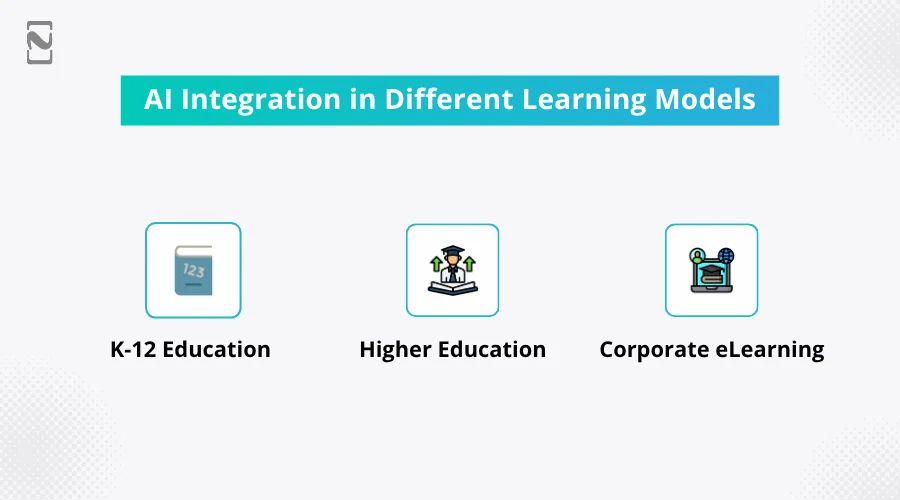
Let’s check out the AI integration in three different learning models.
► K-12 Education
In K-12 schools, AI is widely used to make education more personalized. It helps students in learning at their own speed so that no one feels left behind. AI also helps teachers and other faculty.
Teachers can use AI to manage some tasks, like grading papers or writing reports. This can save lots of time, and they can give more time to students to teach. However, there are also many different types of educational apps now that are powered by AI.
They help students to read perfectly, make math fun through engaging games, and so on. These AI apps are specially designed for both education and enjoyment.
► Higher Education
At the higher education level, or we can say at the college level, AI is helping both students and faculty. One beautiful example is virtual teachers. These are just like smart assistants that help students give answers to their questions anytime, anywhere.
Many universities are also using AI to help students who are facing struggles. Based on how frequently students log in, complete assignments, or answer questions, AI can send reminders or notifications for extra support.
This early assistance can make a huge difference. AI also makes the course content better. For example, if many students are failing a quiz on one topic, it notices that and updates the content. Also, when it comes to managing all the admin tasks, an AI tool can manage all by itself.
► Corporate eLearning
Learning does not stop after school. It is a lifelong process. Many IT companies use AI to train their employees. It is highly useful because everyone can learn what they require, when they require it.
For example, a new employee joins the sales team. AI can recommend a customized training plan, especially for them. Another person in the technology department may have a different learning path. So, it depends on their expertise and knowledge, and this saves a lot of time.
A unique feature here is AI simulations. These make real-life practice situations, like how to talk to a customer. And of course, AI keeps track of progress too. If someone is facing an issue, AI gives them instant feedback and extra resources.
These systems include robots with educational app features like real-time progress tracking, voice support, and so on to boost the overall user experience.
Future Trends in AI for Education
The power of AI in education is changing the experience. It is not just about textbooks. AI for digital education is more about understanding each student’s heart, mind, and journey.
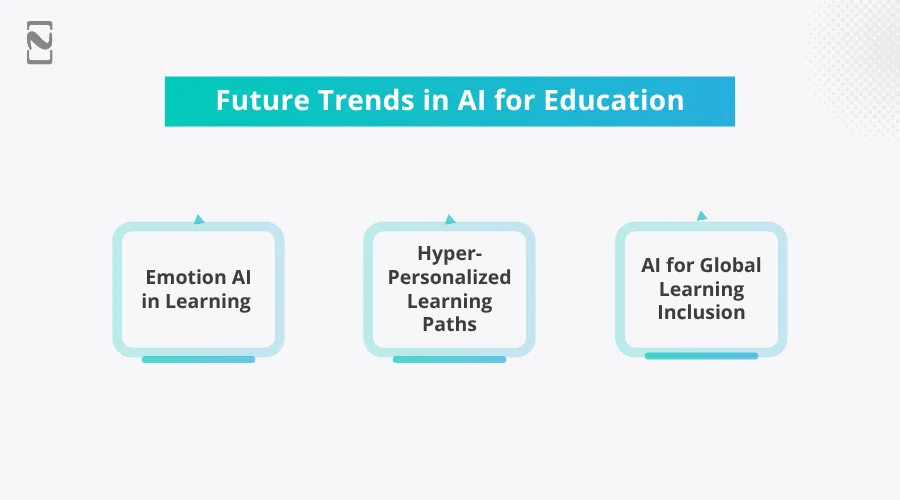
Let’s look at the future trends of AI in the education industry.
1. Emotion AI in Learning
In the near future, AI will not just understand what students are learning, but also how they are feeling. Emotional AI in learning can read facial expressions, voice tones, and body language to analyze if a student is confused, bored, or excited.
This will be one of the best e-learning app trends that will help faculty understand when to step in and support the student. For example, if a student is facing some math problems and gets frustrated, AI can notify the teacher or give a simple explanation. This can make learning supportive and provide a more human touch.
2. Hyper-Personalized Learning Paths
Every student has different learning styles and speeds. AI can help create learning paths that are customized for every student. Also, AI can make a unique learning experience for every student.
This can be possible just by looking at the student’s performance, enjoyment, and challenges they face. For instance, a student who can easily learn from videos will be shown more video content.
However, if a student prefers learning by reading, AI for eLearning platforms will give more text-based content. So, it all depends on their preferences. This type of personalized approach helps students stay engaged.
3. AI for Global Learning Inclusion
AI for personalized education can make the education process more inclusive worldwide. Many language learning apps are fully powered by AI and can help students from multiple regions understand lessons in their regional languages.
Speech-to-text and text-to-speech features can help students with disabilities learn more easily. Besides, AI tutors can provide quality education in remote or rural areas. This makes learning more accessible for everyone, irrespective of their location.
How Nimble AppGenie Helps Integrate AI into Education Apps
Nimble AppGenie is a trusted education app development company. We help in making learning apps smarter by integrating AI.
Our AI education app solutions also answer students’ queries with chatbots, and we add a voice feature to it. Our expert developers integrate AI features into existing platforms smoothly, improving what they can do without changing how users use them.
We ensure that the EdTech AI solutions we create are simple and work on all devices. With our assistance, you can get a world-class education application with AI functionalities.
Conclusion
AI is transforming the way we learn by making education smarter and more personalized. From helping students get instant feedback to supporting teachers with planning and grading, AI in education apps make e-learning easier.
However, it helps students with disabilities and brings quality education to remote areas.
As technology keeps improving, AI will keep making learning better for students and make a huge difference. With the right development partner like Nimble AppGenie, you can create smart and helpful educational apps with the integration of AI-powered technology.
FAQs
AI can improve the performance of an education app by personalizing lessons and giving instant feedback. AI for student performance tracking and progress, answering questions, suggesting content, and making learning fun.
Nimble AppGenie can integrate AI features like personalized learning, smart learning with AI tutors, voice assistants, progress tracking, test generation, language translation, and chatbot support into your education apps.
Yes, AI integration can be slightly costly for education startups. The cost to build an educational app with AI integration can be between $40,000 – $300,000 or more, depending on your project requirements.
The time to develop an AI-powered education application can take 6 – 12 months or more. It depends on the app size, location of developers, and how complex your project requirements are.
Yes, AI in education apps can help students with disabilities by giving personalized support, speech-to-text tools, and learning at their own pace, making learning easier and more accessible.

Niketan Sharma is the CTO of Nimble AppGenie, a prominent website and mobile app development company in the USA that is delivering excellence with a commitment to boosting business growth & maximizing customer satisfaction. He is a highly motivated individual who helps SMEs and startups grow in this dynamic market with the latest technology and innovation.
Table of Contents




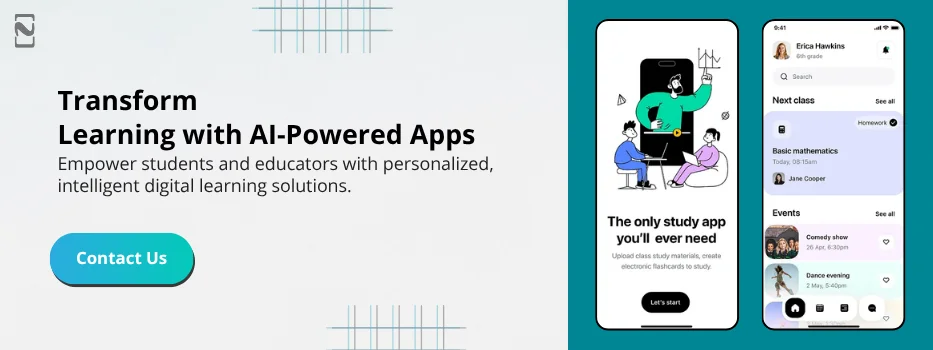
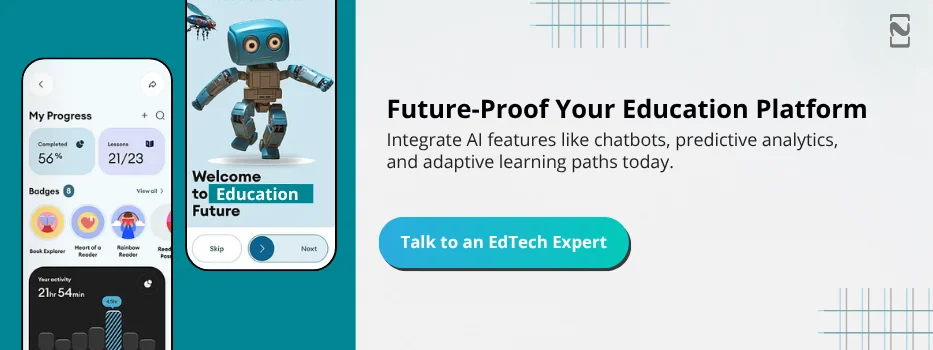
No Comments
Comments are closed.